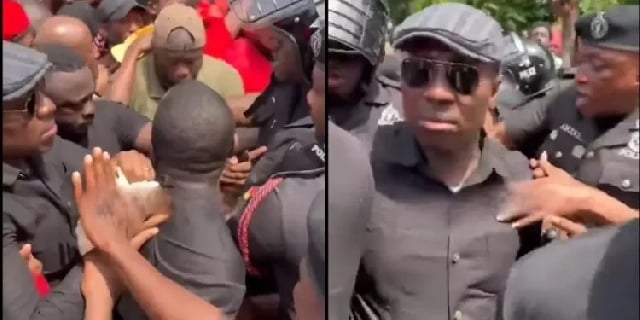The political landscape in an undisclosed location has been roiled by allegations of police misconduct during a “Save the Judiciary” protest, sparking a heated exchange between prominent political figures and igniting a broader debate about the role of law enforcement and the perceived double standards in public reactions to such incidents. The controversy centers around an alleged assault on Minority Leader Alexander Afenyo-Markin by a police officer during the protest. Afenyo-Markin claims he was struck in the chest unprovoked, leaving him breathless and shaken. His demand for an inquiry into the incident has been met with skepticism and counter-accusations, further fueling the political firestorm.
Minister for Communications and Digitalisation, Sam Nartey George, responded to the allegations with a barbed social media post, seemingly directed at Afenyo-Markin and the opposition party. Without explicitly naming names, George alluded to the opposition’s previous defense of state security actions, contrasting it with their current outrage over the alleged assault. He highlighted the perceived irony of those who previously justified similar actions by security personnel now condemning a police officer for allegedly doing his job. This thinly veiled critique served to amplify the already tense political climate, transforming the incident into a public battle of accusations and counter-accusations.
The core of the controversy lies in the divergent narratives surrounding the event and the subsequent public reactions. Afenyo-Markin and his supporters portray him as a victim of unwarranted police aggression, emphasizing the alleged unprovoked nature of the assault. Conversely, George’s response, interpreted by many as directed at Afenyo-Markin, suggests a different perspective, implying that the officer was merely performing his duties and that the opposition is engaging in selective outrage. This clashing of narratives underscores the inherent difficulty in establishing an objective account of the incident, particularly in a politically charged environment where perceptions are often colored by pre-existing biases.
The incident has exposed deeper fault lines within the political discourse, raising questions about the consistency and fairness with which such incidents are judged. The perceived double standard, where previously defended actions by security forces are now condemned, has become a central point of contention. This selective outrage, as implied by George’s post, highlights the tendency to view such incidents through a partisan lens, where the acceptability of law enforcement actions is often contingent on the political affiliation of the individuals involved.
Furthermore, the controversy raises broader concerns about accountability within law enforcement. While Afenyo-Markin’s call for an inquiry suggests a desire to hold the officer accountable, the opposing narrative, as presented by George, seems to downplay the seriousness of the alleged assault. This divergence in perspectives reflects a fundamental disagreement on the appropriate level of scrutiny and accountability for law enforcement actions, particularly in the context of political protests. The incident has become a microcosm of the larger debate surrounding police conduct, highlighting the challenges in achieving a consensus on the appropriate use of force and the mechanisms for ensuring accountability.
The “Save the Judiciary” protest and its aftermath have exposed the fragility of trust in institutions and the deep-seated political divisions within the unnamed location. The conflicting narratives, the accusations of hypocrisy, and the selective outrage all point to a broader erosion of faith in the impartiality of law enforcement and the political system as a whole. This incident serves as a stark reminder of the challenges in upholding the rule of law and ensuring accountability in a polarized political climate, where perceptions of justice are often influenced by political affiliations and pre-existing biases. The ongoing debate underscores the urgent need for a more nuanced and objective approach to assessing such incidents, one that transcends partisan divides and prioritizes a commitment to fairness, transparency, and accountability for all.


